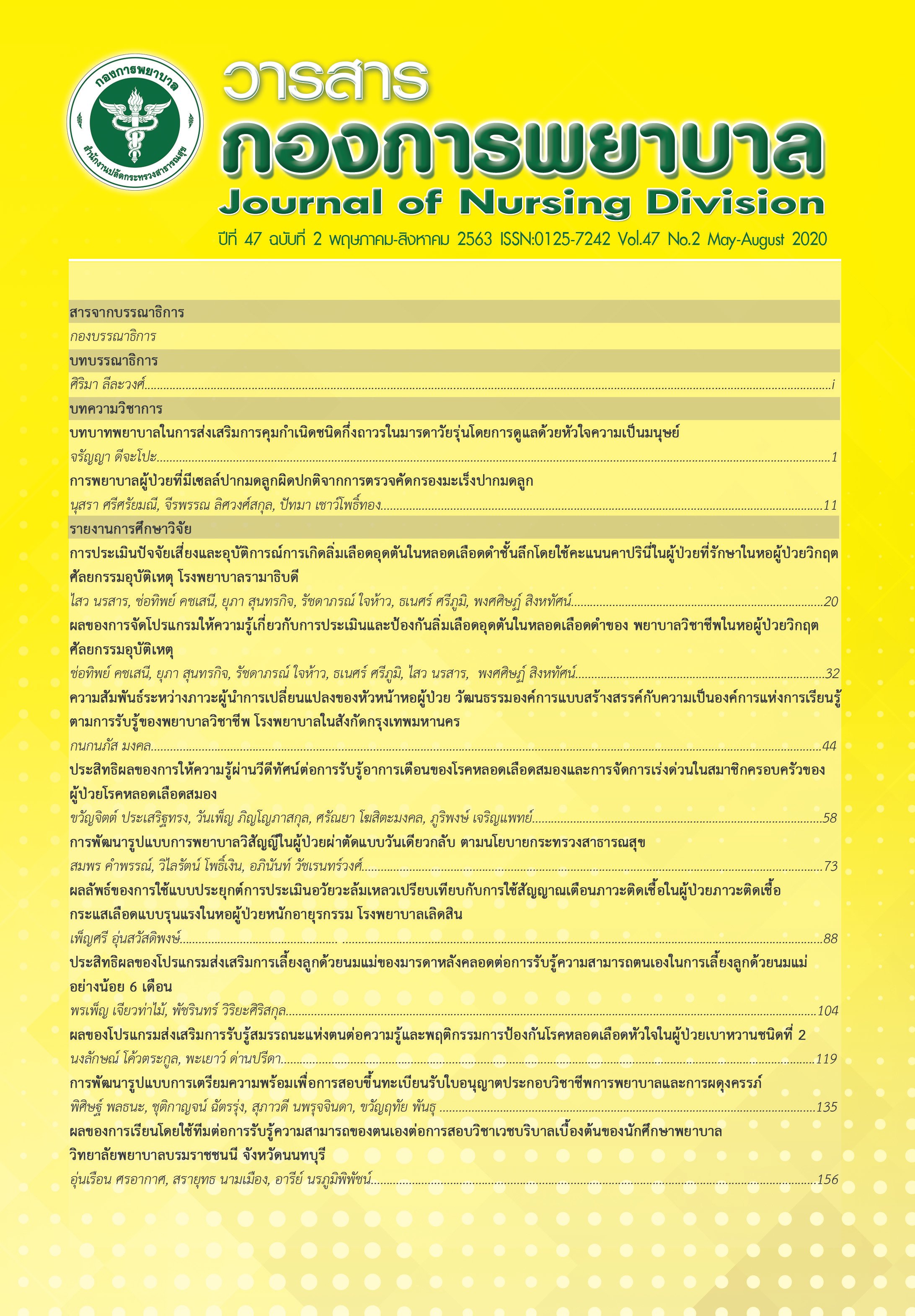ผลของโปรแกรมส่งเสริมการรับรู้สมรรถนะแห่งตนต่อความรู้และพฤติกรรมการป้องกันโรคหลอดเลือดหัวใจในผู้ป่วยเบาหวานชนิดที่ 2
Main Article Content
บทคัดย่อ
การวิจัยนี้เป็นการวิจัยแบบกึ่งทดลอง (Quasi – experimental Research) เพื่อศึกษาผลของโปรแกรมส่งเสริมการรับรู้สมรรถนะแห่งตนต่อความรู้และพฤติกรรมการป้องกันโรคหลอดเลือดหัวใจในผู้ป่วยเบาหวานชนิดที่ 2 โดยใช้แนวคิดการรับรู้สมรรถนะแห่งตนของแบนดูรา กลุ่มตัวอย่างมี 2 กลุ่ม กลุ่มทดลอง 37 คน ได้รับโปรแกรมส่งเสริมการรับรู้สมรรถนะแห่งตนต่อความรู้และพฤติกรรมการป้องกันโรคหลอดเลือดหัวใจในผู้ป่วยเบาหวานชนิดที่ 2 เป็นเวลา 6 สัปดาห์ กลุ่มควบคุม 37 คน ได้รับการพยาบาลปกติ เก็บข้อมูลโดยแบบสอบถามส่วนบุคคล ความรู้เรื่องโรคเบาหวานและปัจจัยเสี่ยงต่อการเกิดโรคหลอดเลือดหัวใจ การรับรู้สมรรถนะแห่งตนและแบบสอบถามพฤติกรรมการป้องกันโรคหลอดเลือดหัวใจในผู้ป่วยเบาหวาน และข้อมูลสุขภาพ วิเคราะห์ข้อมูลด้วยร้อยละ, ค่าเฉลี่ย, Chi-square test, Paired t-test, Independent t-test, Wilcoxon Signed Rank Test และ Mann Whitney U Test
ผลการศึกษาพบว่า ภายหลังได้รับโปรแกรม กลุ่มทดลองมีคะแนนเฉลี่ยความรู้ การรับรู้สมรรถนะแห่งตน และพฤติกรรมการป้องกันโรคหลอดเลือดหัวใจในผู้ป่วยเบาหวาน สูงกว่าก่อนเข้าโปรแกรม และสูงกว่ากลุ่มควบคุม อย่างมีนัยสำคัญทางสถิติ (p<.001) ค่าความดันโลหิต ดัชนีมวลกาย และระดับน้ำตาลในเลือดลดลงกว่าก่อนเข้าโปรแกรม อย่างมีนัยสำคัญทางสถิติ (p<.001) และลดลงกว่ากลุ่มควบคุม อย่างมีนัยสำคัญทางสถิติ (p<.001, p<.05, p<.05 ตามลำดับ) ดังนั้นโปรแกรมส่งเสริมการรับรู้สมรรถนะแห่งตนต่อความรู้และพฤติกรรมการป้องกันโรคหลอดเลือดหัวใจในผู้ป่วยเบาหวาน ใช้เป็นแนวทางการพัฒนาปรับเปลี่ยนพฤติกรรมสุขภาพ ทำให้มีระดับความดันโลหิต ดัชนีมวลกาย และระดับน้ำตาลในเลือดลดลง นำไปสู่การลดภาวะแทรกซ้อนและป้องกันโรคหลอดเลือดหัวใจจากโรคเบาหวานได้
Article Details
เอกสารอ้างอิง
2/500-type-2-diabetes.
2. Viyanrat A, Puavilai G. Diabetes Mellitus, In: Viyanrat A. Textbook of diabetes mellitus, 1st ed. Bangkok: Ruenkaew Printing; 2003: 1-413. Thai.
3. Tammeepakdee S. The Empowerment Programme of Diabete Millitus Complication Prevention for The Elderly Pateint In Nongphai Health Promotion Hospital,
Nadun District, Mahasarakam Province [Dissertation] Mahasarakam: Faculty of Graduate, Mahasarakham University; 2016. Thai.
4. Division of Non Communicable Diseases. Study of premature death situations in Thailand. [Internet]. 2017 Feb 16 [Cited 2020 Jan 10];Available
from:http://www.thaincd.com/ 2016/mission/documents-detail.php?id=12501&tid=32&gid=1-020. Thai.
5. Ratrasan Ch. Diabetes outbreak and its impact in Thailand. [Internet]. 2013 Jan 1 [Cited 2020 Jan 10]:Available
from:https://www.novonordisk.com/content/dam/Denmark/HQ/sustainablebusiness performance-on-tblmore-about-how-we-
work/Creating%20shared%20value /PDF/Thailand%20Blueprint%20for%20Change_2017_TH.pdf. Thai.
6. Junthakul W. Effect of a participatory learning program on knowledge and behaviors to prevent cardiovascular complications in patient with Type 2 diabetes
mellitus in the community [Dissertation].Mahasarakam: Faculty of Graduate, Mahasarakham University; 2017. Thai.
7. Jiamjarasrungsi W, Lohsuntorn V. Lifestyle Modification in a Group at High Risk for Diabetes. Journal of Health Systems Research. 2008; 2(3):464-76. Thai.
8. Division of Non Communicable Diseases. Guidelines for Assessment of Cardiovascular Risk. [Internet]. 2017 Feb 16 [Cited 2020 Jan 10] Available from
http://www.thaincd.com/ document/file/download/knowledge. Thai.
9. Bandura A. Self-efficacy: the exercise of control. New York: W.H. Freeman and Company; 1997.
10. Keawkumtai B. Effects of the perceived self-efficacy walking exercise program on HbA1c level and health-related physical fitness in older persons with
diabetes mellitus [Dissertation]. Mahasarakam: Faculty of Graduate, Mahasarakham University; 2015. Thai.
11. Faul, F., Erdfelder, E., Buchner, A.and Lang, A.-G. Statistical power analyses using G*Power 3.1: Tests for correlation and regression analyses. Behavior
Research Methods. Behavior Research Methods. 2009;41(4):1149-60.
12. Faculty of Medicine Ramathibodi Hospital. Thai CV risk score. [Internet]. 2015 Jan 1 [cited 2020 Jan 15];Available from:
https://med.mahidol.ac.th/cardio_vascular_risk/thai_cv_risk_score/. Thai.
13. Ratanapitak U., Krainuwat K., Sriwijitkamol A., Vipawattana C. The Effects of a Diabetic Self-management Program on Knowledge, Behavior, and Health
Indexes among People with Type 2 Diabetes. Journal of Nursing Science. 2013; 31(1):7-18.Thai.
14. Supanpiew Th. Effects of self-efficacy for modification of health behavior to prevent diabetes in risk group through community participation
[Dissertation].Mahasarakam:Faculty of Graduate, Mahasarakham University; 2016. Thai.
15. Panyoyai P. Effect of the self-efficacy and social support enhancement program on exercise behavior among the elderly with diabetes mellitus [Dissertation].
Chiang Mai: Faculty of Graduate, Chiang Mai University; 2007. Thai.
16. Ruankham Ch. Factors predicting health promoting behaviors among the elderly with diabetes mellitus [Dissertation]. Chiang Mai: Faculty of Graduate,
Chiang Mai University; 2004. Thai.


